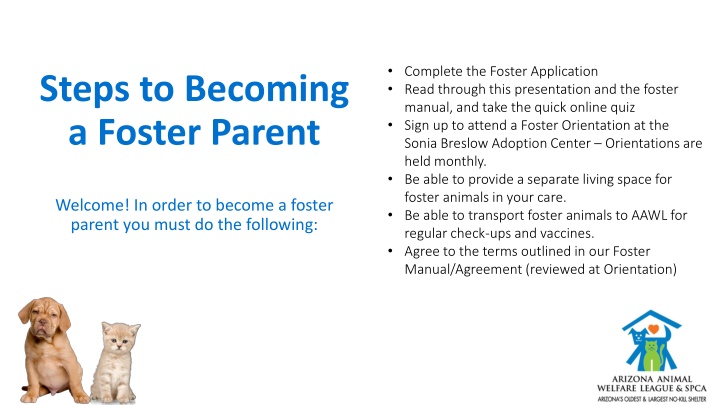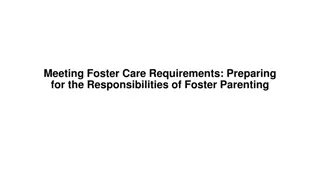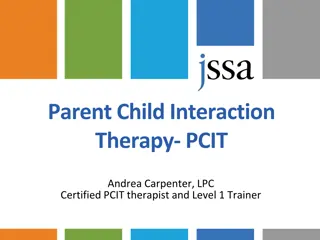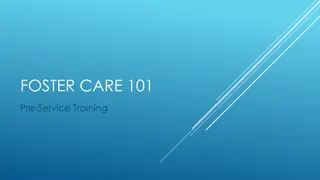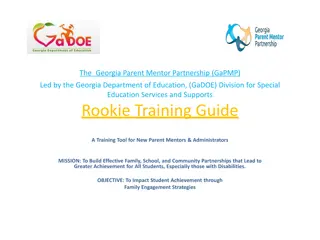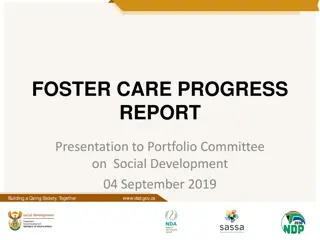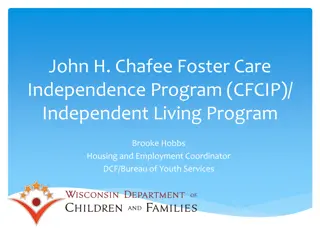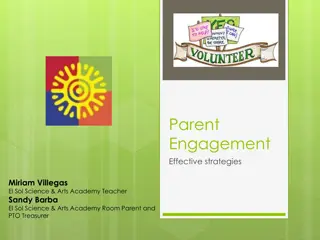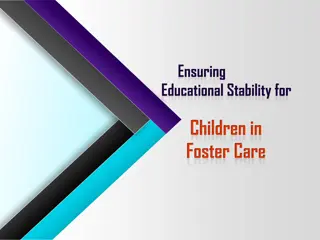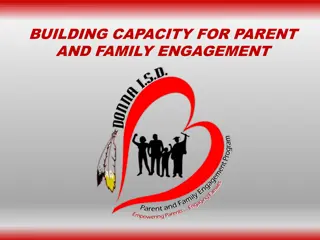Become a Foster Parent for AAWL: Steps and Requirements
Join the Arizona Animal Welfare League's Foster Care Program by following the steps outlined: complete the application, attend orientation, and provide a separate living space and transportation for foster animals. Learn why fostering young animals is crucial and the guidelines for integrating them with personally owned pets. This program aims to save more animals and prepare them for adoption. Understand the responsibilities and commitment required to offer temporary care and love to animals in need.
Download Presentation

Please find below an Image/Link to download the presentation.
The content on the website is provided AS IS for your information and personal use only. It may not be sold, licensed, or shared on other websites without obtaining consent from the author.If you encounter any issues during the download, it is possible that the publisher has removed the file from their server.
You are allowed to download the files provided on this website for personal or commercial use, subject to the condition that they are used lawfully. All files are the property of their respective owners.
The content on the website is provided AS IS for your information and personal use only. It may not be sold, licensed, or shared on other websites without obtaining consent from the author.
E N D
Presentation Transcript
Complete the Foster Application Read through this presentation and the foster manual, and take the quick online quiz Sign up to attend a Foster Orientation at the Sonia Breslow Adoption Center Orientations are held monthly. Be able to provide a separate living space for foster animals in your care. Be able to transport foster animals to AAWL for regular check-ups and vaccines. Agree to the terms outlined in our Foster Manual/Agreement (reviewed at Orientation) Steps to Becoming a Foster Parent Welcome! In order to become a foster parent you must do the following:
Our Purpose The purpose of the AAWL Foster Care Program is to increase the number of animals that the Arizona Animal Welfare League can save and to help underage and recovering animals so they can find loving adoptive homes. Offering your time, hearts, and homes to these animals will allow them every opportunity to be adopted in permanent, loving homes and lower our homeless pet population throughout the state. This training presentation provides you with a basic understanding of AAWL s guidelines along with general information regarding the care and well-being of foster animals. Additional information and training is provided at the Foster Orientation.
Why do these animals need to be in a Foster Home? Why Foster? Kittens and puppies that are too young for adoption need to have care until they are old enough to be put up for adoption. Kittens are not big enough for surgery until they are at least 2 lbs and 8 weeks old. Puppies must be 8 weeks old for surgery. Kittens and puppies need to be socialized and introduced to a variety of people and situations while they are small to ensure they are grow up to be healthy adult animals. This presentation is intended to familiarize new foster parents with the basic requirements of fostering kittens and puppies to ensure this is a proper fit for you and your household.
Personally-Owned Pets For health reasons, your pets should be current on all vaccines and flea/tick treatments. We require felines to be tested for FELV and FIV. If you have not had your cats tested, AAWL will test them for $14 per cat. It is recommended that AAWL foster animals be isolated from your pets for a minimum of 2 weeks, if not for the entire time while in foster care. After the 2 weeks you can allow your pets to socialize with foster animals while under supervision, however, you must understand that AAWL is not responsible or liable for any medical care to personally owned pets resulting form these interactions. Any and all veterinary expenses for personally owned animals are the sole responsibility of the owner. You do have access to AAWL s Low Cost Vet Clinic, MDPet Care for inexpensive veterinary care. You must have the support of all the individuals living in your home prior to bringing home foster animals as their lives will most likely be affected by this decision. Your dog(s) may be required to come to the shelter for meet other dogs and be evaluated by staff behaviorists depending on the foster situation.
Our regular foster care program matches volunteers with animals who need special care in a home environment: Underage and/or under socialized puppies and kittens Mom dogs with puppies or mom cats with kittens Animals needing a quiet place to recover from medical conditions. Each year, more than half of our adopted animals are placed in foster care at some point during their stay at AAWL. Different Types of Fosters Determine which animals you would like to foster. AAWL ADOPTS MORE THAN 4,000 ANIMALS EACH YEAR [ ]
Neonatal Birth to 2 weeks 1 week old the umbilical cord falls off 10 days old the eyes begin to open 2 weeks old the eyes and ears are fully open During this time kittens are completely dependent on their mother (or foster parent) for thermoregulation, food and elimination Weaning 4 to 6 weeks Start to use the litter box and potty on their own Start to experiment with eating dry food Eyes will begin to change color at about 6 weeks Weaned 6 weeks and older Should be fully eating on their own Actively participating in play with humans and other kittens Kittens Developmental Stages: Kittens are born feral and will instinctively hiss when they smell a threat but quickly adapt to human touch this is why early socialization is to important. [ ]
Neonatal Birth to 12 days Born blind and deaf they will move towards whatever side they are touched on First 3 days they have a flexor dominance and will curl when you pick them up Days 4 21 they have extensor dominance and stretch when picked up During this time puppies are completely dependent on their mother for thermoregulation, food and elimination. Socialization 3 to 12 weeks Around 4 weeks begins to wean from mom dog Starts to play and learns bite inhibition through puppy play-biting with siblings Experiment with eating dry foods Should be exposed to different sounds, sights, textures, etc to prevent fear Puppies Developmental Stages: [ ] Puppyhood isn t something that lasts just a few weeks. Dogs don t become adults until sometime between 1 and 2 years of age.
To People Always pick kittens and puppies up with two hands. Do not pick them by the head, legs, or tail Let as many adults and kids handle the puppies or kittens as possible. Children must have adult supervision. To Situations Household noises Every day noises like the vacuum, TV, radio, washer/dryer, etc. Doorbell and knocking To Places Always transport puppies and kittens in a carrier Take them on short car rides if possible Going to the Vet: Kittens and puppies need to come to the shelter every 2 weeks for vaccines and any medical issues that may arise Appointments should be scheduled with the foster department Puppies & Kittens Socialization:
AAWL will provide all supplies: food, Xpens, crates, litter, medication, etc Always keep the moms with their kittens or puppies. The moms will take care of the babies. Monitor the eating habits and note any sign of illness or distress. There is a possibility moms may get sick as well. Bottle-fed puppies or kittens need to be fed every 2-3 hours, need a constant source of heat, and need to be stimulated to go to the bathroom until they are 3 weeks old. If a foster animal becomes sick in your call you must call the foster department and come in for an appointment. Appointments are Monday Saturday. Due to the fragile nature of foster most will get a URI (upper respiratory infection) or diarrhea while in your care. Medication will be prescribed and typically requires dosage 1 2 times a day. Puppies & Kittens Care & Feeding:
Medical Concerns Discharge from the nose or eyes, or swollen eyes Sneezing or difficulty breathing congestion Wounds infection Hair loss bald spots Limping Dehydration Not eating or weight loss Listlessness How to Get Help Call the Foster Department x 114 Call the AAWL Clinic x 117 Puppies & Kittens Medical Concerns and How to Get Help
Foster Failure Sometimes foster parents fall in love with their foster puppy or kitten and would like to adopt it this is perfectly fine! We fondly refer to these folks as foster failures. Adopting your foster doesn t mean you have to stop fostering, in fact, we hope you continue so many more puppies and kittens can be rescued! Sick Kittens or Puppies Foster animals do get sick due to the rough start they have. Most of the time we see upper respiratory infections (URI/cold) and diarrhea. These conditions are easily treated. Most fosters need some type of medication at one time or another. Losing Kittens Fading Kitten Syndrome is a reality for any kitten foster. We send very young animals into foster homes and sometimes their immune system is not strong enough to fight off diseases or they are underdeveloped and not able to survive. This is not from lack of care it just happens. If a foster dies you will be asked to bring it back to the shelter so we can determine the cause of death and provide closure for you. Puppies & Kittens Foster Concerns
Going on Vacation If you are planning on going out of town you should not agree to take on any foster animals. We cannot take back foster animals while you go out-of-town as we don t have enough space onsite to hold the animals. We understand that emergencies can happen and may result in you needing to suddenly leave town. In the event that an emergency happens please notify the Foster Care staff immediately with the dates you will be gone and your intended return date. The Forster Care program will do their best to find alternative foster home placement, however it is not guaranteed that you will get the animals back upon returning. The AAWL foster animals are not under any circumstances to be placed in boarding facilities including veterinary clinics, or animal hospitals. Taking a Break Fostering can be mentally, physically and emotionally draining and we all need to take a break every once in a while. Please keep the foster department updated on your availability and always take care of yourself! Puppies & Kittens Foster Concerns Continued
Adult cats and dogs are sent into a foster home on a case-by- case basis. They may need to recover from surgery (leg surgery, knee surgery, hip surgery, etc), or they may have some behavior issues. Some of them are shy and do not do well in a shelter environment. There are many reasons we might choose to place an animal in foster care, each one is unique to the animals needs. Adult Cats & Dogs In each situation we will explain what is needed for the animal and you can decide if you want to that animal. In all foster situations you have the final say in whether or not you want to take in an animal.
Out take must be to free ourselvesby widening our circle of compassion to embrace all living creatures and the whole of nature and its beauty. - Albert Einstein
